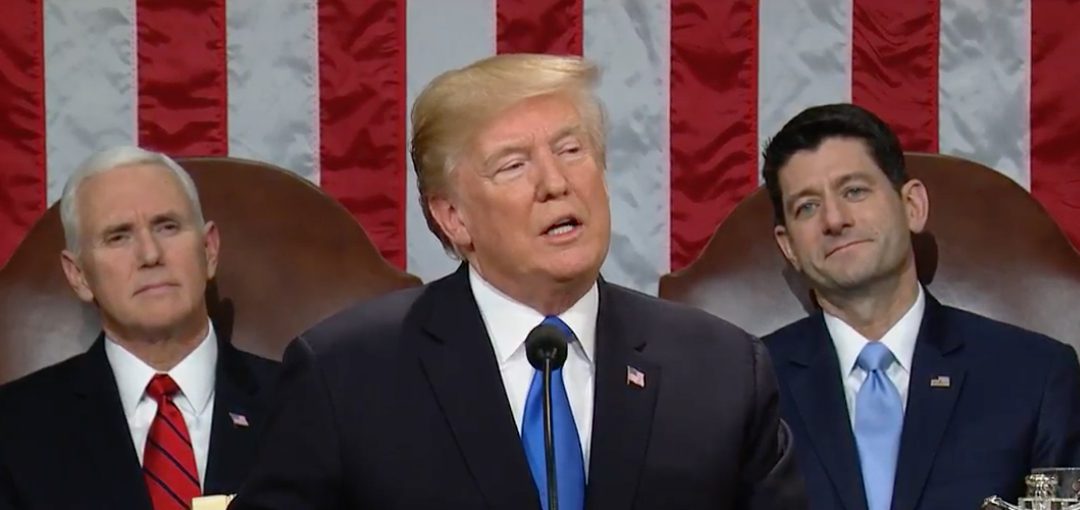WASHINGTON–President Donald Trump said a proposed infrastructure plan would build a “gleaming” America in his first State of the Union address. He called on Congress to draft a bill that generates at least $1.5 trillion in new infrastructure investment.
“I am asking both parties to come together to give us safe, fast, reliable and modern infrastructure that our economy needs and our people deserve,” Trump said.
While the administration has yet to release full details of the plan, a leaked version of the outline published by Axios indicates that half of the funding would support grant-based infrastructure projects through private, state and local investments. Some funding would be allocated for “transformative” projects that focus on innovation, the plan says.
The president and his staff are focused on cutting the red tape that can delay infrastructure improvement projects, Gary Cohn, the White House economic advisor, told CNBC.
“We built the Empire State Building in just 1 year — is it not a disgrace that it can now take 10 years just to get a permit approved for a simple road,” Trump asked. Cohn says the administration seeks to streamline the approval process for major projects to less than two years.
Under the draft plan, 25 percent of the funds would be invested in rural infrastructure grants that have no federal requirements. That would allow state and local governments to use the money for their unique needs, ranging from water and waste systems to broadband internet.
While both parties have long prioritized infrastructure, little progress has been made in Congress. The biggest issue has been how to pay for various proposals. U.S. Secretary of Transportation Elaine Chao acknowledged that there is “great disagreement” about how to fund the proposal last week.
Chao added that Republicans want to fund $200 billion of the $1 trillion and rely on the private sector for the rest.
Senate Democrats propose $1 trillion in federal spending in a “Blueprint to Rebuild America’s Infrastructure.” Shouldering the cost is the fiscally responsible route, and could create 15 million jobs, they said in the report.
The Congressional Progressive Caucus called for a $2 trillion infrastructure investment over 10 years, Ted W. Lieu, a Democratic Congressman from Los Angeles County, said in a statement Tuesday.
“If Trump wants a bipartisan solution to rebuild our transportation, water, energy, and information systems, while massively overhauling our country’s unsafe public buildings, we’ve got the plan for him,” Lieu said.
Rob Portman, a Republican Senator from Ohio, said expansion and training in the workforce should be a top agenda item for the year.
“With regard to infrastructure, we simply don’t have the workforce available right now to undertake the kind of massive new infrastructure push that we’re talking about so, we’ve got to figure out how to get more people into the workforce with the training they need to meet the jobs that are out there,” Sen. Portman said in an interview with The Hill.
The budget draft suggests that current “restraints” on the development of transit systems could be stripped back. Early outlines of the proposal strike down laws that protect water, air, wildlife, and visitors in National Parks and other public lands, a report from the National Parks Conservation Association said.
“The administration argues that these rollbacks are necessary to expedite these projects. This is a false choice. To allow these rollbacks is to risk losing our natural, historical and cultural heritage our nation sought to preserve in the first place,” Theresa Pierno, the president and CEO of NPCA, said in a statement.
Congress could improve national infrastructure by enhancing the Highway Trust Fund, which was established in 1956 to pay for Interstate System improvements, a Tax Policy Center report said. The tax of 18.4 cents per gallon of gasoline has not been increased by Congress in 25 years even though gas prices have shot up.
That’s put more pressure on congressional appropriations to provide projects with funding, said Brianna Fernandez, a data analyst with the center-right American Action Forum. In a report she wrote that was published Tuesday, she called for changes to the HTF to make it solvent.


